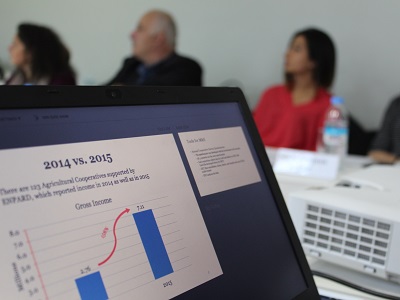Facilitating cooperation among Georgia’s smallholders is one of the main focuses of the ENPARD project, of which ISET is a (small) part. ENPARD has been active in Georgia since 2013, and its work has been extensive and its efforts invaluable. An evaluation effort coordinated by the ISET Policy Institute has uncovered some interesting facts and figures from comparative analysis between 2014 and 2015.
Implemented by four NGO consortia since January 2014, in its first year ENPARD supported 82 cooperatives, with a total of 775 members (37% of whom were females), while in 2015, ENPARD endorsed a further 118 coops made up of 1180 members (34% of whom were females).
• Between 2014 and 2015, the average size of the cooperative increased by 5.8% and reached 10 members per cooperative
• Females were revealed to be best represented in flower and poultry cooperatives. Not surprisingly, there are no women in machinery groups. In addition, the top regions where females are highly represented as members of cooperatives are Samtskhe-Javakheti, Mtskheta-Mtianeti and Samegrelo, largely rural rather than industrial areas. (2015)
• The largest coop consists of 32 members who are in the business of beekeeping and honey; the smallest (with just three members) is in winemaking. (2015)
• For 70% of all members, agriculture is the main source of income. (2015)
• The highest penetration of ENPARD-supported coops is observed in the apiculture (18), hazelnuts (13) and cereals (13) sectors. (2015)
On Thursday October 6, these and other findings were discussed at a workshop on the Monitoring and Evaluation (M&E) of ENPARD supported cooperatives (see the news on the first workshop). Hosted by ISET, this workshop was attended by all four ENPARD implementing consortia: CARE, Oxfam, Mercy Corps, People in Need (PIN) and the ENPARD Communication Unit. Rati Kochlamazashvili from ISET presented the results of the Annual Cooperative Survey, which was followed by a discussion amongst the participants.
ISET itself is a member of the CARE consortium together with RDA and GFA. The institution is proud to have a leading role in ENPARD’s Monitoring and Evaluation working group, tracking the development of ENPARD supported cooperatives and suggesting changes to its project design and the overarching policy framework.











